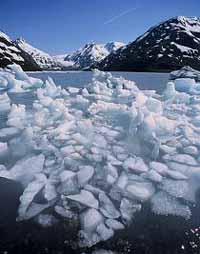Scientists turn attention to world's poles to gauge global warming
Are we really heading for an ice-free Arctic?

More than 50,000 researchers hope to find an answer, by plumbing the depths and scoping the surfaces of the planet's poles in a massive study of how global warming and other phenomena are changing the coldest parts of the Earth and what that means for the rest of it.
Scientists formally kicked off the International Polar Year on Thursday, the biggest such project in 50 years, unifying researchers from 63 nations in 228 studies to monitor the health of the polar regions, using icebreakers, satellites and submarines. The project ends in March 2009.
Global warming "is the most important challenge we face in this century," Prince Albert II of Monaco said in launching the project in Paris. "The hour is no longer for skepticism. It is time to act, and act urgently."
He noted an authoritative report released last month by the Intergovernmental Panel on Climate Change that said global warming was unequivocal, very likely human-caused and would last for centuries.
A scientist on that panel warned that the world could be heading for an ice-free Arctic, a proposition backed up Thursday by Ian Allison, a co-chair of the International Polar Year committee.
"The projections are that ice in the Arctic will disappear in the summer months. There will no longer be perennial ice ... sometime within the next century," he said.
"This will have enormous consequences" for the 4 million people living in polar regions and well beyond, he said, as the melting ice disrupts ecosystems all the way to the Equator.
Many people rely on multiyear snow packs for their water, for example, the scientists said.
In stressing the global impact of the polar study, Michel Jarraud of the U.N. World Meteorological Organization said a major breakthrough of the last International Polar Year, in 1957-1958, was in scientists' understanding of the tropics and their weather systems.
This time, the scientists are armed with much better technology, especially satellites to study polar regions, known as the cryosphere. They will study everything from the effect of solar radiation on the polar atmosphere to the exotic marine life swimming beneath the Antarctic ice.
The polar year is being sponsored by the U.N.'s World Meteorological Organization and the International Council for Science. About US$1.5 billion (EUR1.14 billion) has been earmarked for the year's projects by various national exploration agencies, but most of the money comes from existing polar research budgets.
In classrooms around the world Thursday, teachers conducted ice-related activities and experiments to call attention to the project, organizers said.
Two leading researchers formally launched the project at Paris' Palace of Discovery museum by slicing into an enormous cake made to look like a glacier, topped with meringue and caramelized "icicles."
Besides yielding a more complete picture of the impact of global warming, the cooperation will help try to quantify the amount of fresh water leaking out from underneath ice sheets in Antarctica. The melting which is distinct from the break up of glaciers has alarmed climate scientists because it takes place beneath the ice and is difficult to measure.
Other projects include the installation of an Arctic Ocean monitoring system, described as an early warning system for climate change, and a census of the deep-sea creatures which populate the bottom of Antarctica's Southern Ocean.
The Antarctic's lakes and mountains some trapped under about 3 miles (5 kilometers) of ice for more than 35 million years will be sounded. Using telescopes, balloons and spacecraft, scientists at the poles will investigate plasma and magnetic fields kicked up by the sun the dry, clear polar air is ideal for astronomy. Anthropologists are also planning to study the culture and politics of some of the Arctic's 4 million inhabitants, reports AP.
Nearly all the projects touch in some way on the fear that the environment being studied might someday melt away.
Subscribe to Pravda.Ru Telegram channel, Facebook, RSS!


